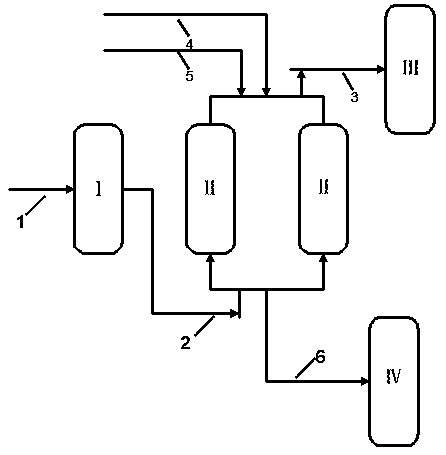Ammonia removal method of distilled ammonia wastewater
A technology for distilling ammonia wastewater and deammonization, which is applied to chemical instruments and methods, water pollutants, water/sewage treatment, etc. It can solve the problems of undisclosed deammonization, detarring, high equipment requirements, ozone leakage, etc., and achieve regeneration The effect of simple and reliable operation, low equipment investment and short process
- Summary
- Abstract
- Description
- Claims
- Application Information
AI Technical Summary
Problems solved by technology
Method used
Image
Examples
Embodiment 1
[0035] The specific implementation is as figure 1 As shown in the device process, the ammonia distillation wastewater with a tar concentration of 181mg / L, a volatile ammonia content of 3g / L (ammonium bicarbonate, free ammonia), and a COD (chemical oxygen demand) of 2000 mg / L is fed into the The adsorption tower of the adsorbent, wherein the adsorbent is a molecular sieve adsorbent, and the adsorbent is a hydrophobic ZSM-5 molecular sieve; the waste water after adsorption is sent to the storage tank; part of the waste water in the storage tank is reused as cooling water, and a part emission. The tar content in the treated wastewater was 2.2 mg / L, the ammonia nitrogen content was 80 mg / L, and the COD content was 500 mg / L.
Embodiment 2
[0037] The specific implementation is as figure 1 In the device process shown, the ammonia distillation wastewater containing tar concentration of 200mg / L is sent to the adsorption tower filled with adsorbent, wherein the adsorbent is molecular sieve adsorbent, and the adsorbent adopts TS-1 molecular sieve; Ammonia wastewater is sent to the storage tank; part of the wastewater in the storage tank is reused as cooling water, and part of it is discharged. The ammonia distillation wastewater before treatment contains a tar concentration of 200mg / L, a volatile ammonia content of 3g / L, and a COD of 3000 mg / L. In the treated ammonia distillation wastewater, the tar content is 3 mg / L, and the ammonia nitrogen content is 60mg / L. L, COD content is 200 mg / L.
Embodiment 3
[0039] The specific implementation is as figure 1 As shown in the device process, the ammonia distillation wastewater containing tar concentration of 220mg / L is sent to the adsorption tower filled with adsorbent, wherein the adsorbent is a molecular sieve adsorbent, and the adsorbent adopts Ti-MOR molecular sieve; the ammonia distillation after adsorption The waste water is sent to the storage tank; part of the waste water in the storage tank is reused as cooling water, and part of it is discharged.
[0040] The ammonia distillation wastewater before treatment contains a tar concentration of 100mg / L, a volatile ammonia content of 4g / L, and a COD of 1000 mg / L. In the treated ammonia distillation wastewater, the tar content is 1 mg / L, and the ammonia nitrogen content is 50mg / L. L, COD content is 100 mg / L.
PUM
 Login to View More
Login to View More Abstract
Description
Claims
Application Information
 Login to View More
Login to View More - R&D
- Intellectual Property
- Life Sciences
- Materials
- Tech Scout
- Unparalleled Data Quality
- Higher Quality Content
- 60% Fewer Hallucinations
Browse by: Latest US Patents, China's latest patents, Technical Efficacy Thesaurus, Application Domain, Technology Topic, Popular Technical Reports.
© 2025 PatSnap. All rights reserved.Legal|Privacy policy|Modern Slavery Act Transparency Statement|Sitemap|About US| Contact US: help@patsnap.com

